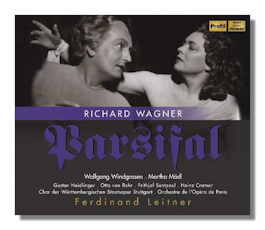
The Internet's Premier Classical Music Source
Related Links
- Wagner Reviews
- Latest Reviews
- More Reviews
-
By Composer
-
Collections
DVD & Blu-ray
Books
Concert Reviews
Articles/Interviews
Software
Audio
Search Amazon
Recommended Links
Site News
 CD Review
CD Review
Richard Wagner

Parsifal
- Paul Bauer
- Heinz Mende
- Martha Mödl
- Gustav Neidlinger
- Hetty Plumacher
- Otto van Rohr
- Friederike Sailer
- Wolfgang Windgassen
- Frithjof Sentpaul
- Lore Wissmann
- Olga Moll
- Heinz Cramer
- Siegfried Fischer-Sandt
- Karl Rieser
- Toni Schabo
- Gerhard Schott
- Franziska Wachmann
Stuttgart State Opera Chorus
Paris National Opera Orchestra/Ferdinand Leitner
Hänssler Profil PH09009 4CDs
This interesting but uneven recording dates from 26 March 1954. At the time Ferdinand Leitner was the general music director for the Württemberg State Opera in Stuttgart. Stuttgart was so highly regarded for Wagner productions in the 1950's (with Wieland Wagner a regular visitor) that it became known as the "Winter Bayreuth", and the company made guest performances of Wagner in England, France, and Italy (including a complete Ring at the Florence May Festival in 1957). The present recording is the record of a guest performance at the Palais Garnier in Paris, with a representative set of Stuttgart soloists and the Stuttgart choir, accompanied by the Archestre de l'Opéra de Paris.
The cast of principals is extremely strong, particularly Wolfgang Windgassen as Parsifal and Martha Mödl as Kundry (both sang the same roles at Bayreuth that year under Hans Knappertsbusch). Gustav Neidlinger makes an uncharacteristic appearance as Amfortas, while Gurnemanz is sung by the somewhat less known Otto von Ruhr.
The highlights of this set are primarily vocal. Windgassen is a magisterial Parsifal in Act III, and suitably anguished in Act I. Mödl is magnificent as Kundry. The long duet in Act II is required listening for all Wagner-lovers. Neidlinger's Amfortas has more than curiosity value, but he does not seem to have entirely internalized the role. The anguish works well, but the self-laceration less so. Gurnemanz is well sung, although plainly some levels below Hans Hotter, the dominant Gurnemanz of the time. Von Ruhr's Act III duet with Parsifal is finely sung, and somewhat more effective than their Act I encounter.
I have few complaints about the conducting. Leitner's interpretation is well-paced and architecturally sound. The preludes and orchestral section reveal his ability to bring out the color and range of Wagner's orchestration. Sadly, though, the orchestra is up against a restless and tubercular audience, silenced only by wonderful singing in the second half of Act II – at least until the final bars, when an early clapper provokes an atmosphere-destroying round of sshhes. Stage noises interfere with the climaxes of the other two acts, with a particularly loud crash at the end of Act III. Anybody contemplating purchasing this set will of course be used to noisy audiences and on-stage crashes. But here it does seem to be worse than usual and severely detracts from the enjoyment of some fine singing and conducting.
In sum, this was doubtless an excellent performance, and the quality of the transfer is good, but there are too many extraneous sounds for it to be recommended as a performance, rather than as a record of some very fine individual interpretations.
Copyright © 2012, José Luis Bermúdez





















